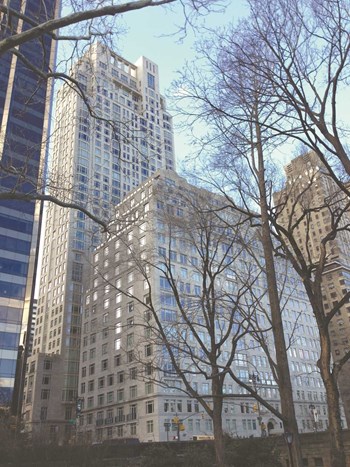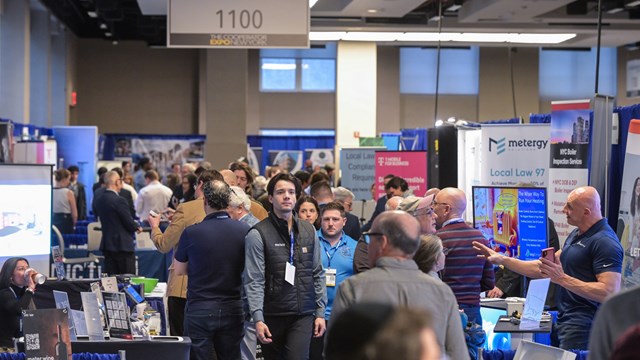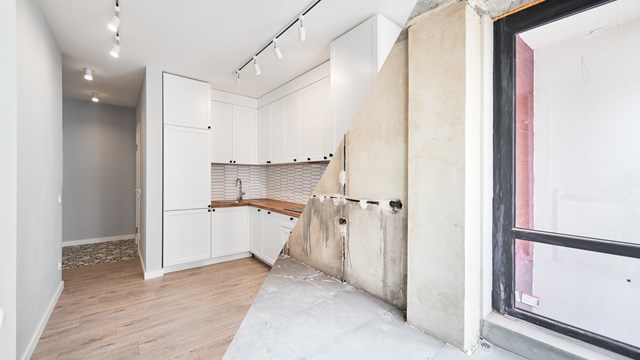
Despite what people mutter about real estate being in a down cycle in other parts of the region, in New York City, people are spending tens of millions on jaw-dropping properties throughout the city, with record-breaking sales being logged in 2012 and even more likely in 2013 as the economy continues to recover.
New York is often referred to the Capital of the World. Holding real estate in New York is sometimes an investment, sometimes a trophy, sometimes a home, and sometimes a home-away-from-home. This is especially true when you are talking about super luxury buildings and the people who live there. “These people have multiple residences and lead a global life. They are not tied to any particular country,” Kirk Henckels, vice chairman and director of Stribling & Associates Ltd., says.
The Definition of Luxury
Super luxury buildings have separate doorman and concierge services. They have white glove uniforms and elevator operators. They deliver mail to the residence’s doorsteps. They have private dining rooms, theater screening rooms and libraries.
“The qualifier for ‘super-luxury’ varies, but many buildings are now providing hotel style service and high-end concierge companies on-site,” says Nick Jabbour, senior vice president of Nest Seekers International. “These services can include shoe-shining, in house valet and cleaning services, assistance with booking trips, restaurants and theater tickets, and handling nearly any request. Buildings are increasingly featuring in-house spas and other pampering services as well.”
For example, 15 Central Park West offers a full restaurant for the residents exclusively, and the Trump International Hotel and Tower at 1 Central Park West allows residents to order from Jean-Georges, situated on the ground level. The ultimate luxury, though, remains a view of Central Park.
Frances Katzem, a managing director at residential brokerage Douglas Elliman says the luxury market is back and more competitive than ever, with new developments asking record-breaking prices per square foot.
“Most buyers who are able to purchase in this sector of the market expect their spending to go far, meaning they’re looking for a list of lavish amenities on top of a beautiful and expansive living space,” Katzen says. “These buildings are beginning to cater to the lifestyle needs of their buyers, and include amenities like valet parking, rooftop pools, art galleries, and 5,000-square-foot roof decked terraces.”
Pedigreed Properties
Super-luxe apartments in exclusive buildings are a different breed of property, both in terms of how they’re sold and how they’re purchased.
“Super luxury has several components—and not all need be present for the building (or apartment) to qualify. It starts with the quality and quantity of the staff in the building, the amenities, appearance and sophistication of the lobby and other common areas,” says Adam H. Stone, an attorney with the law firm of Regosin, Edwards, Stone & Feder. “But these factors may all be present in a ‘merely luxury’ building. The apartment itself will qualify as super luxury first and foremost by its square footage. Other factors are views, outdoor areas, finishes, extent of remodeling work etc.”
Condos vs. Co-ops
For those with the means, there is almost no limit to the square footage, amenities, finishes, and other luxuries available in both vintage and brand-new co-op/condo apartments.
“Anyone can swoop in and buy up a condo or two or three. So for those with the ‘super luxury’ money who don’t want a picky board snooping through their financial statements, condos will remain more popular,” Stone says. “Co-ops are seen as the old money buildings and those owners are happy to have the restrictive rules in place about deciding who is fit to share the same address as them.”
Jacky Teplitzky, managing director of Douglas Elliman in New York, says that there are not that many differences nowadays between the two, other than the difficulty of getting into a super luxury co-op and passing the board.
“You will need high profile social reference letters. You need to know people in the building and belong to the right social clubs,” she says. “The package sometimes has to be bound in specific binders, and the board will specify the measurements and the type of binder they require. You also need a truck to deliver some of these packages.”
As condos become more prevalent, the values of co-ops have come down significantly, therefore, nearly all luxury buildings which have been built or converted in the last 15 years have been condos.
“This is because there’s inherent value in the freedom of ownership that a condominium provides, and opens the units up to international investors with minimal need for overly invasive applications, interviews, etc.,” Jabbour says. “Therefore, most super-luxe co-ops tend to be somewhat older buildings, and the super-luxury that goes along with them is the exclusivity that the board maintains over the building. That’s not to say that owners aren’t afforded the luxury of exquisite service, but as a matter of amenities such as gyms, pools, outdoor spaces, floor to ceiling windows, are relatively rare in cooperatives.”
There is another consideration in the condo vs. co-op argument. According to Patricia Kantor, a partner with the law firm of Edwards Wildman Palmer, boards of luxury building are often faced with purchasers who intend to make extensive renovations before moving in, which will impact the entire building.
"They may ask at the outset what you intend to do, when do you plan to do it and how long will it take. There are some co-ops that will only let you do extensive renovations in the summer when a lot of their residents tend to be away," she says. "Major renovations are disruptive to the daily routine and can cause security concerns. In addition, the type of renovation can prove to be a hazard to the building, i.e., a leaking pool can cause extensive damage for other owners."
Marketing Matters
The marketing of luxury properties and effective tactics run the gamut. In some cases, transactions are brokered by phone, via a network of brokers of contacts. This is to protect the owner, if desirous of privacy.
More recently, as New York City has become a favorite place for overseas investors to place hard assets, all-encompassing marketing campaigns that are web-based are likely the most appropriate and effective way to expose these properties in a supply and demand driven market such as New York City.
“Some of these residences are not on the open market as the owners don’t want everybody to know that they are selling,” Teplitzky says. “These owners are partners in major law firms, investment bankers and hedge funds, etc. so they do not want their sphere of influence to know that they are selling.”
Outside Manhattan
According to Teplitzky, it’s not just Manhattan that is offering up super luxury buildings. “For example, Prospect Park in Brooklyn is behaving like areas such as Park Avenue, Fifth Avenue and Central Park West in Manhattan,” she says. “The buildings are very difficult to get into.”
There’s also the Clock Tower building in DUMBO, with its quadruplex penthouse best known for the glass-walled, four-sided clock and a glass elevator running up its center, which is currently priced at $18 million. “That is the classic trophy property over there that no foreign purchaser has bought yet,” Henckels says. “It just hasn’t sold.”
The Buyers
The price of living in a super luxury building obviously limits who can and cannot live there and those that can are usually limited to the upper echelon of celebrities, executives and foreign businessmen. Many investors from Dubai and Russia also snap up super-luxe apartments and buildings.
“Arguably being the capital of the finance, fashion, and entertainment industries, there is plenty of demand by high-level executives and celebrities to make their homes here,” Jabbour says. “Simultaneously, because Manhattan real estate inventory is so finite, that is to say, you generally have to remove inventory to add inventory, the opportunity for market saturation is relatively limited. It is a safe place to park capital, and that does motivate international investors to acquire these properties, both on a speculative basis, as well as a safe haven.”
The current buyer pool Katzen is working with includes out-of-state buyers who love New York, as well as foreigners, mainly from Asia, the Middle East, Latin America and Russia.
Henckels explains that for many of these buyers, money means nothing to them and the Russians are all about purchasing the best of the best.
“If you’re worth $4 billion, what does $30 million really mean? The nature of the business has changed really because of the foreign element, especially the Russians,” he says. “They have bought in London, the South of France and Switzerland, and now enough of them have bought here because it’s a safe place to put money. They like to one-up each other and it just becomes another destination for them.”
According to Stone, the super luxury market was slowed somewhat by the recession and since it’s a limited market to begin with, some buildings may have suffered. “The recession did enter everyone’s consciousness so whether someone’s wallet was directly impacted or not —their psyche certainly was,” he says. “It has come back somewhat—there are still Russian billionaires out there!—but fewer people could make those purchases.”
The High-End Broker
The abilities and skills necessary for brokers when dealing in the very high-end are generally the same as the low end and at the top of the list is the need for discretion.
“You’ve got to be a trusted consultant,” Jabbour says. “Many high net-worth individuals strongly prefer to go under the radar, and recognizing that is paramount.”
The ability to be flexible with the schedule of owners and purchasers at the ultra high end is also very important. One has to manage their time to get the work done, but many of these clients have obligations all over the world, and very tight schedules. Further, extensive market knowledge is vital.
“You have to have an expertise and a knowledge when you deal with prices this large,” Henckels says. “It also helps if you have a broader business knowledge—a place your negotiating skills were honed or experience with finance or legal issues, because foreign sales are fraught with legal issues. And contacts don’t hurt.”
Compensation runs parallel to the price of the property. If a broker is not on top of the market trends, movement, values, and offerings within the various buildings offering property valued at the top end of the market, he or she is not providing service that parallels the compensation.
“What sets us apart is that we know the boards. We know in each building what the board is looking for, who they will accept and/or reject,” Teplitzky says. “With extensive years of experience and years of working with the buildings we get to know the inside secrets and nuances of each board.”
Keith Loria is a freelance writer and a frequent contributor to The Cooperator.






Leave a Comment